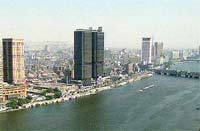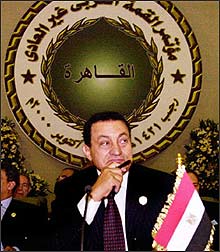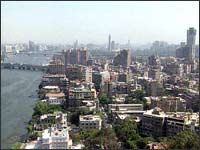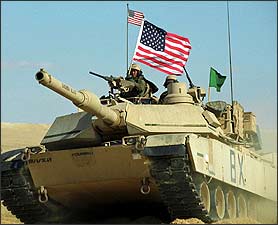Appeal of Fundamentalism Growing in Egypt
 |
| Egyptian governmental seal (AP) |
In Egypt, the revolution will not be televised. There, the
revolution is being crushed.
It is Friday, just before noon prayers in the heart of old
Islamic Cairo. The second week of bombing is underway in Afghanistan
and throughout the Moslem world there were protests against
U.S. action, but not here. The police presence is none too subtle.
At the Al-Azhar Mosque, the oldest Mosque in Egypt, the seat
of the nation's spiritual leader, the Sheikh of Al-Azhar, the
crowds hurry past a squadron of uniformed police and plainclothes
men who make no attempt to hide the pistols sitting on their
hips. A single Egyptian camera crew has turned up in anticipation
of some kind of event. They go away empty handed.
Other days, al-Azhar is not guarded. Learning goes hand in
hand with prayers.
In a stairwell by the entrance a teacher helps a young man in
his twenties memorize the Koran.
The feeling you get walking the streets of Tehran and Cairo
is that Egypt, where revolutionary Islam is suppressed, is a
much more devout place than the Islamic Republic of Iran, run
by Islamic clergy.
Nevertheless Ayatollah Khomeini's successful overthrow of the
Shah remains the benchmark for Egypt's Islamic revolutionaries
according to Hala Mustafa, of the Al-Ahram Institute.
 |
| Cairo skyline, and the Nile River(AP) |
"Most of the militant groups who emerged in the seventies
in Egypt were really inspired by the Iranian revolution and
of course the Iranian way of ruling," she says.
Islamic radicals have yet to stage their revolution, but their
presence in Egypt has changed the social order.
The society has become "Islamized," according toMona
Makrana Ebeid, professor of sociology at the American University
of Cairo and a former member of the Egyptian Parliament. "Secular
voices are very faint," she says, and the process has accelerated
in the past decade.
The Sheikh of Al-azhar Mosque is the supreme cleric in Egypt.
The Egyptian government of President Hosni Mubarak, refers decisions
to him on a range of issues, not just questions that skirt religious
sensibility like organ donation, but practical issues like land
reform as well.
The process of Islamization cuts across all social classes
in Egypt.
Fifty years ago, Egypt's educated elite were secularists. Gamel
Abdel Nasser's revolution of 1952 did nothing to change that.
He too was a secularist, with a socialist bent. However, secularism
was critically wounded by one event according to sociologist
Mona Makrana Ebeid.
Six Day War's Lasting Effect
In 1967, was the Six Day War. In less than a week, the Egyptian
Air Force was destroyed, Israeli armored divisions seized Sinai
and rolled to the edge of the Suez Canal less than three hours'
drive from Cairo. It was a national trauma for Egyptians. "It
was only after '67 that this whole religious resurgence started
to emerge," says sociologist Ebeid. "The people had
felt so humiliated, so desperate so angry and so lost so the
one refuge was religion."
Because of the defeat of 1967, a generation of politically
radical students turned away from Nasser's form of socialism.
According to Professor Ebeid, they didn't turn very far.
She says that the slogans of the Islamic movement were often
the same slogans as the socialists slogans of the 40s, 50s,
and 60s. "They're asking for more equity, they are fighting
against corruption they want more justice and more morality.
.. They feel their traditions are getting lost and their authenticity
is disappearing under the burden of modernity or what we call
today globalization.," she says.
Long before globalization, there was a world economic order.
It was called colonialism, and it was run from Europe. After
World War I, that economic order began to fall apart. Nationalist
movements surged through the colonial world. In Egypt, in the
1920's a group combining nationalist sentiment with Islam was
formed. They called themselves the Muslim Brotherhood. Today,
their leader Essan al-Aryan says the group is the most popular
party in Egypt
It's a remarkable claim considering the Muslim Brotherhood
is banned from Egyptian politics.
 |
| Egyptian President Hosni Mubarak (AP)
|
Egypt is essentially a one party state and has been since Nasser's
time. There are 444 seats in the Egyptian Parliament. Close
to 90 percent are held by President Mubarak's National Democratic
Party and allied groups. Since the Muslim Brothers can't field
candidates as a party, individuals who support them stand as
independents. These independents make up the second largest
group in Parliament. The Brotherhood really wields its influence
elsewhere according to Essan el Aryan.
From the Mosques the Brotherhood provides services usually
associated with the state: health programs, welfare and education.
Education is a critical part of Revolutionary Islam, around
the Muslim world it is in the schools or Madrassahs, that Islamic
politics are inculcated in young minds.
Only the autocratic power of President Mubarak seems to stop
the onward march of revolutionary Islam in Egypt. Mubarak's
government has been criticized for its anti-democratic tendencies.
However, Hala Mustafa, of the Al-Ahram Institute, says the critics
are wrong. The time for true democracy is only after a solid
foundation is laid
 |
| Another view of the Cairo skyline (AP)
|
"One of the mistakes made by the west is giving much attention
to the democratization process in the Arab or Muslim countries
before giving attention to secularizing these societies. It
will never be a real democracy without secular developments,"
says Mustafa.
Still, the government has many critics. There are 13,000 political
prisoners in Egypt. They are detained under special security
legislation enacted following the assassination of Egyptian
President Anwar Sadat by radical Muslims.
Lawyer Montasser Zayat represents those prisoners as they come
to trial. He works from personal experience. After Sadat's assassination,
Zayat, a member of Islamic Jihad was among the first thrown
in prison under the special laws. The irony in the Sadat murder
is that the late president was an extremely devout Muslim, his
forehead marked with the permanent bruise of those who pray
five times a day. That not enough for the radicals zays Zayat.
As Egyptian society became more Islamized, revolutionary groups
like Islamic Jihad and Gamaa al Islamiya became more aggressive.
The harder the Mubarak regime suppressed them, the more violent
these groups became. Finally, in 1997 the radicals attacked
a group of tourists at the ancient Temple of Luxor killing 57
of them. The government crackdown became so severe that the
leadership of Islamic Jihad and Gamaal-islamiya left Egypt.
They went to Afghanistan to join Osama bin-Laden and Al Qaeda. Among those who left
was a man who was tortured alongside
Montasser Zayat twenty years ago, Ayman al-Zawahiri, bin Laden's chief deputy.
An international movement needs an international enemy. Islamic
revolutionaries have two.
The Twin Enemy: America and Israel
 |
| US Army M1A2 tank after completing Operation
Brightstar training exercise (AP) |
On a Mediterranean beach west of Alexandria an Egyptian Army
Band serenades an assembly of military bigwigs with popular
tunes from the days of the British Empire. Operation Brightstar
is taking place, the biennial joint military maneuvers between
the U.S. and Egypt and several other Mediterranean countries.
Today the assembled troops are rehearsing a beach assault.
Overhead Egyptian pilots fly their U.S.-built F-4's in support.
Bright Star is part of Egypt's peace dividend. Because Egypt
signed the Camp David accords, it can purchase U.S. weapons
like the F-4 and train with American forces.
The Mubarak government is happy to take part. However, it is
precisely this kind of U.S. military activity in a Muslim country
that enrages Islamic revolutionaries. If you point out to an
Egyptian radical that his country is the second largest recipient
of American foreign aid, not all of it in the form of military
hardware, it won't gain you much credit. That's because the
largest recipient of U.S. foreign aid is Israel.
Around the Muslim world, anger at the U.S. is not directed
at the American government for its support of regimes that are
autocratic and frequently corrupt. A reading of the Egyptian daily press
shows the hatred for the U.S. comes
from its support of Israel. Israel is seen, for example in the words of
Egypt's al-Akhbar newspaper as "the
reason behind the calamities in the world."
Governments use the press in Egypt and throughout the Arab
World as a pressure valve. Columnists can't vent anger about
their regimes unless they want to lose their jobs and end up
in jail, but they can freely vent rage at Israel and the
U.S.
To an American traveling in the region it often seems like
the news comes from a parallel universe where all facts are
reversed.
On the beach west of Alexandria, Egypt and America are allies,
in the streets of Cairo, America is the friend of the enemy,
and therefore an enemy itself.
Continued: Meanwhile, Attitudes Shifting
Iran



